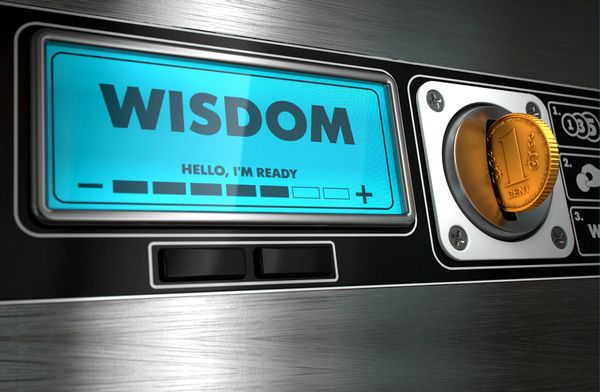Humorist Will Rogers once said, “Good judgment comes from experience, and a lot of that comes from bad judgment.” But acquiring wisdom solely by experience has a psychological price. Is learning life’s lessons “the hard way”… the only way?
Simply to know is not to be wise.
In his ten volume work Nicomachean Ethics, the Greek philosopher Aristotle (384–322 B.C.E.) distinguishes between two intellectual virtues, or beneficial qualities: sophia and phronesis (pronounced fron’-ay-sis). According to Aristotle, sophia is the ability to discern why the world is the way it is. Phronesis, on the other hand, is concerned with how to act in particular situations. It is often translated as “practical wisdom” or “prudence.”
Aristotle explains that while we can learn the principles of what to do, applying them in the real world, in situations we could not have foreseen, requires experience of the world. Thus, unlike factual knowledge, gaining phronesis requires time, maturity, and suffering. He concludes that becoming “world-wise” involves more than straightforward reasoning—it comes from our having ridden tall in the saddle, walked the talk, been there and done that.
What is wisdom? In The March of Folly: From Troy to Vietnam (1984), historian and two-time Pulitzer Prize winner Barbara Tuchman defines wisdom as “the exercise of judgment acting on experience, common sense, and available information.” In practice, wisdom often requires new thinking about old problems; in some cases, these new ideas might not be acceptable at first. Here are some descriptors of what constitutes wisdom:
- Wisdom implies an understanding of people, of values, and ourselves.
- Wisdom is not the same as knowing facts; rather, it’s knowing how to use knowledge.
- Being wise is not the same as being clever (you can be too clever for your own good).
- Learn from the mistakes of others; you don’t have time to make all of those mistakes yourself.
- Wisdom comes not so much from experience but from reflecting on experience and then assimilating it.
Experience has a price.
In his Poor Richard’s Almanac, American statesman Ben Franklin wrote, “Experience keeps a dear school, but fools will learn at no other.” Note that Franklin did not say, “Experience is the best teacher,” as is commonly quoted. Rather, he meant that experience can be a costly way to acquire wisdom. For example, your driver’s ed. class showed you those gory photos of mangled cars and dried blood expressly so you wouldn’t have to learn by experience.
Yet, many young persons seem disinclined to heed Dr. Franklin’s advice. This is unfortunate, because the wisdom you gain from experience is always won at a psychological price. It may, for instance, be the loss of your naivety or the end of innocence. It could be the embarrassment of realizing you are not as unique as you thought. Or, that maybe your parents were right after all. In the school of hard knocks, you may pay a high price for the lesson.
Make a deposit in your future.
 Observing how others screwed up is a great way to learn what not to do. A certified smart person knows her limitations and realizes that being embarrassed is preferable to being dead. And for those who ignore the warnings—thinking you know better, or this time is different—yeah, stick your finger in the lamp socket to see if it’s energized. Bet you won’t do it again.
Observing how others screwed up is a great way to learn what not to do. A certified smart person knows her limitations and realizes that being embarrassed is preferable to being dead. And for those who ignore the warnings—thinking you know better, or this time is different—yeah, stick your finger in the lamp socket to see if it’s energized. Bet you won’t do it again.
This is something that people your parents’ age really want to pass on to your generation. You’ve heard all the lectures . . . but did you listen? Of course you didn’t. Still, it’s never too late to become a mature decider (see: It’s our choices, Harry). Your receptivity to ask, listen, reflect, and acquire wisdom from others is the coin to sharpen your judgment and be that much better prepared to succeed. Make your deposit today.
Gen NeXters, you need not suffer your way to wisdom!
Experience is a hard teacher because she gives the test first, the lesson afterwards.
~ Vernon Law, pitcher, Pittsburgh Pirates
Learn more about this, and other interesting topics, in the Young Person’s Guide to Wisdom, Power, and Life Success.
Image credit: “Wisdom – Inscription on Display of Vending Machine” by Illia Uriadnikov, licensed from 123rf.com (2015).





















